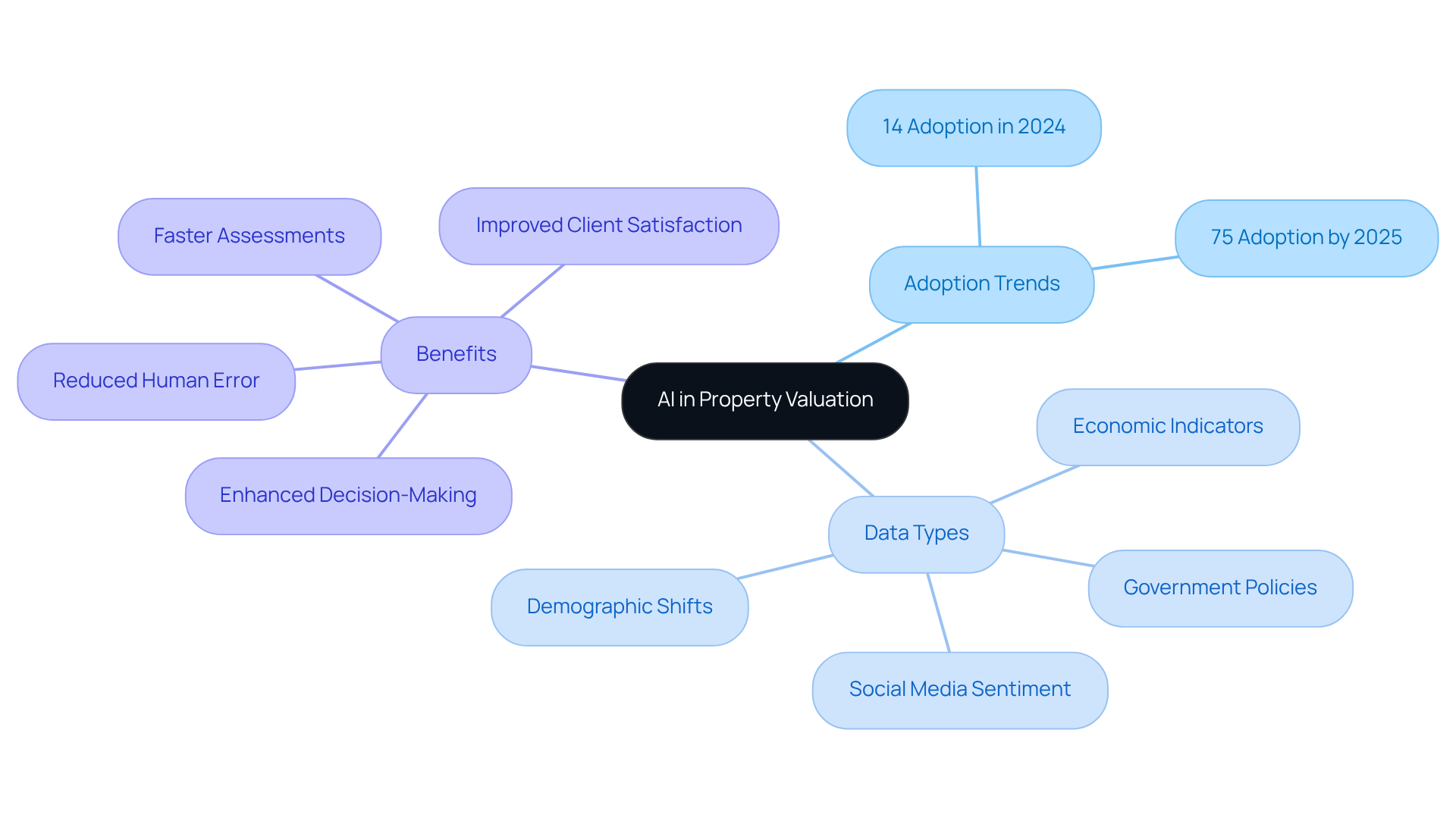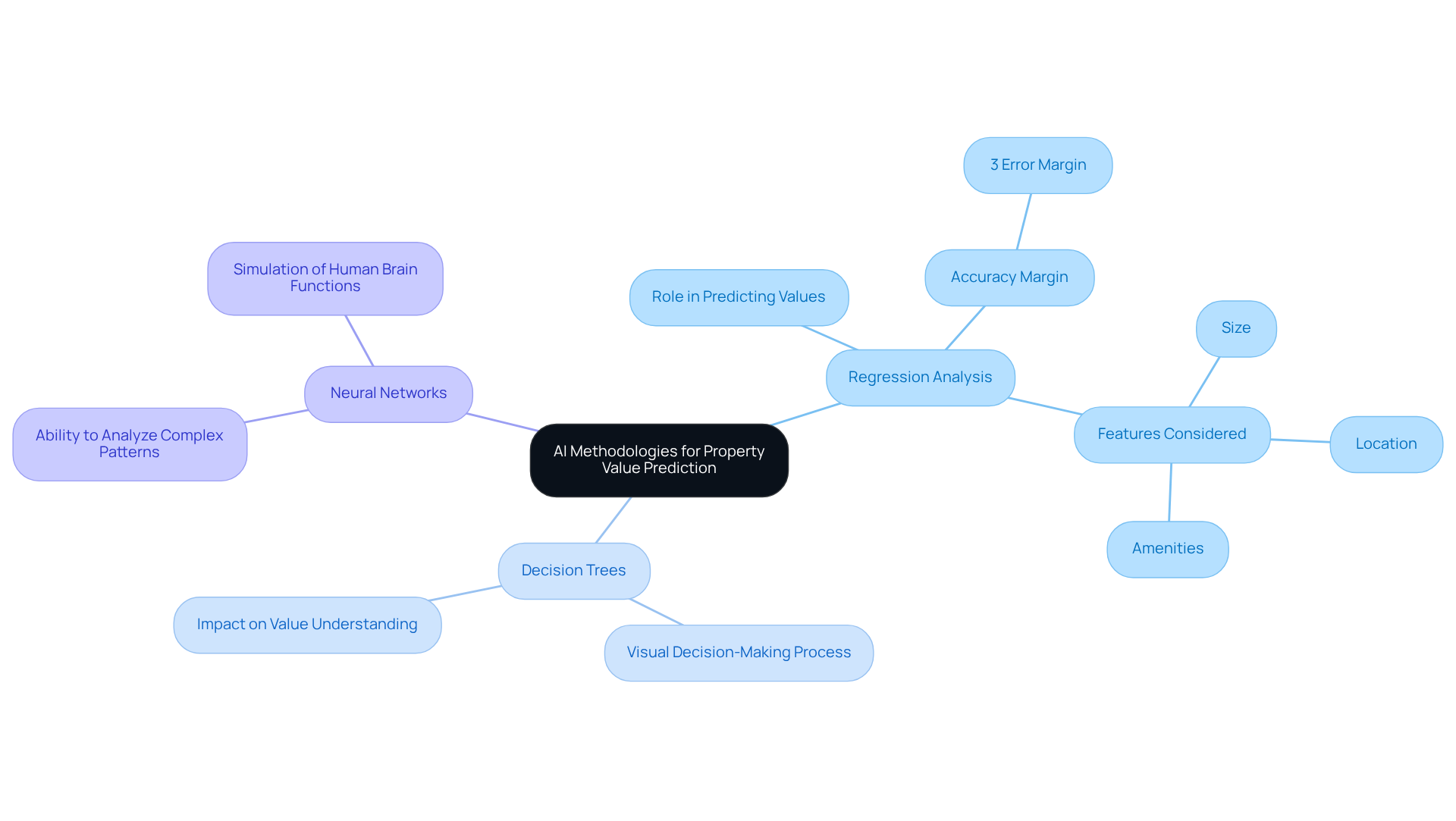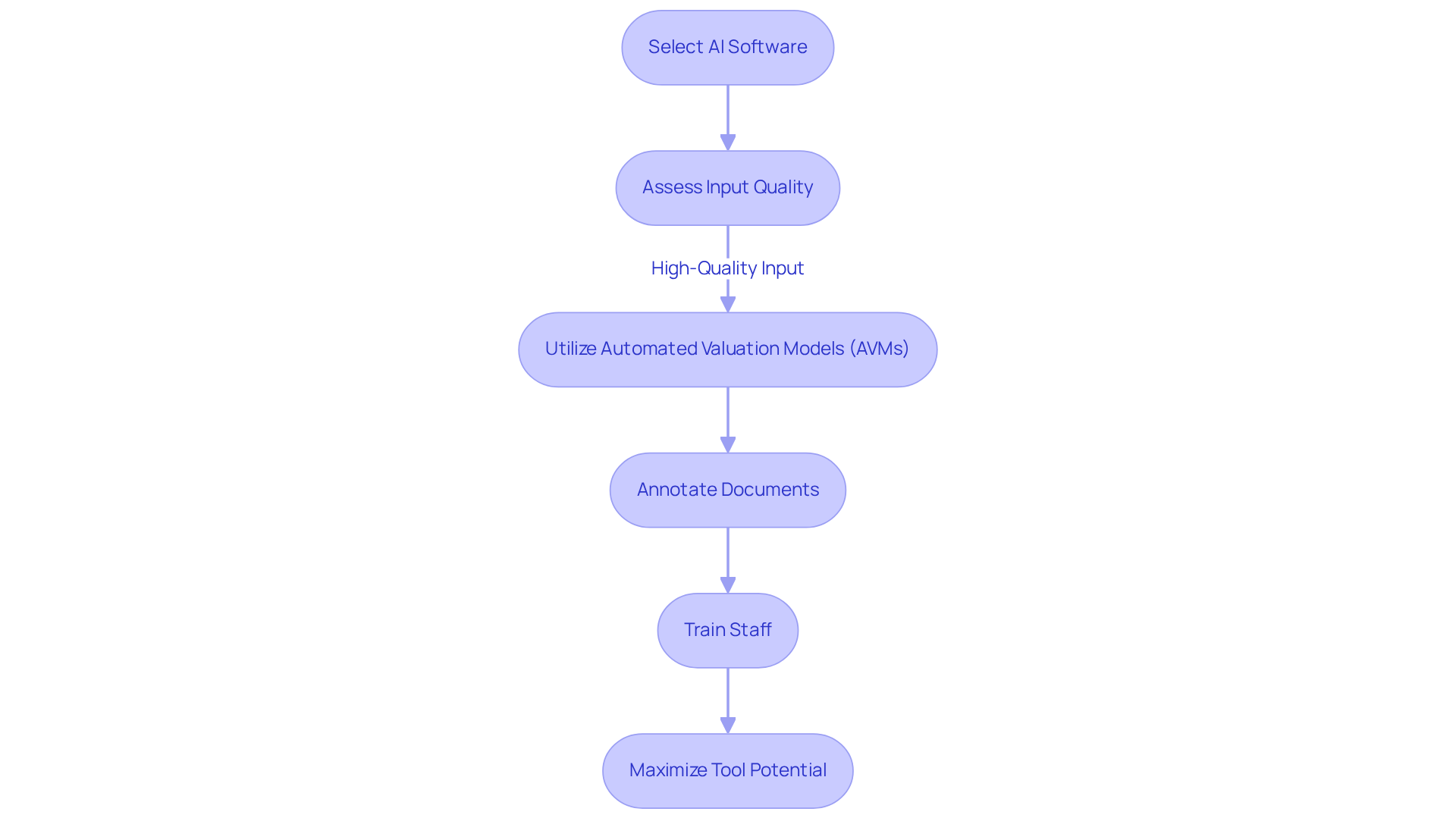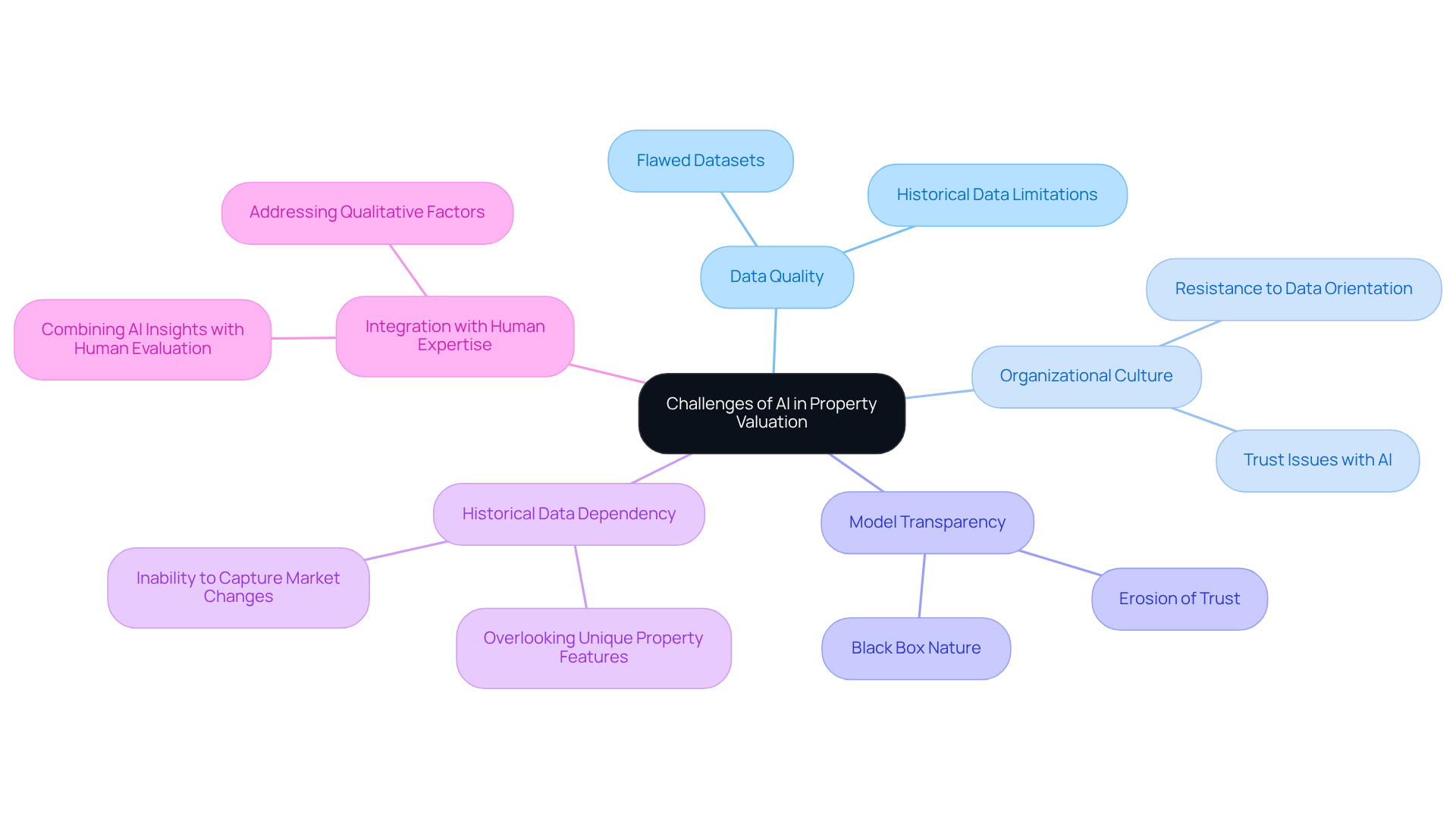Overview
AI predicts property value by analyzing extensive datasets and employing advanced algorithms. This approach leads to highly accurate valuations, significantly enhancing the efficiency of real estate assessments. The article supports this assertion by detailing various AI methodologies, such as:
- Regression analysis
- Decision trees
These techniques allow for precise predictions and demonstrate AI's transformative role in the property valuation process.
Introduction
Artificial Intelligence is fundamentally reshaping the landscape of real estate valuation, harnessing vast datasets and sophisticated algorithms to deliver unparalleled accuracy in property assessments.
As the industry braces for a significant surge in AI adoption among real estate professionals, the potential advantages of this technology become increasingly evident—enhancing decision-making, streamlining processes, and minimizing human error.
However, amidst this promising evolution, critical questions emerge regarding the reliability of AI predictions and the implications for traditional appraisal methods.
How can title researchers effectively integrate AI tools while navigating the inherent challenges and limitations of this technology?
Explore the Role of AI in Property Valuation
Artificial Intelligence (AI) is revolutionizing real estate assessment by harnessing extensive datasets and sophisticated algorithms to illustrate how AI predicts property value with exceptional accuracy. By 2025, approximately 75% of real estate experts will have adopted AI technologies for asset evaluations, a significant increase from just 14% in 2024, underscoring a rapid growth trend in the sector.
AI systems meticulously analyze historical sales data, market trends, and specific asset characteristics to demonstrate how AI predicts property value, alongside various data types such as:
- Economic indicators
- Demographic shifts
- Government policies
- Social media sentiment
This technology not only expedites the assessment process but also reduces human error, establishing itself as an indispensable tool for real estate professionals. Furthermore, by integrating AI into their workflows, title researchers can significantly enhance their decision-making capabilities and provide clients with timely and accurate property assessments. Moreover, AI's ability to continuously learn from new information ensures that valuations remain relevant and reflective of current market conditions.
However, concerns regarding AI's potential to displace jobs in the appraisal industry have persisted since at least 1995, emphasizing the necessity for professionals to adapt and view these technologies as tools rather than adversaries. As Naveen Joshi, a foremost authority on AI applications in real estate, states, 'Machine learning models require a wide range of data to provide accurate predictions.'
Success stories are plentiful, such as AI-enhanced virtual staging, which can elevate inquiries by up to 200%, and AI-driven management platforms that can increase rental income by as much as 9% while reducing maintenance costs by 14%. These advancements underscore how AI predicts property value in the evolving landscape of asset valuation.

Understand AI Methodologies for Property Value Prediction
AI methodologies for predicting asset values demonstrate how AI predicts property value using advanced machine learning techniques, notably regression analysis, decision trees, and neural networks. Regression analysis is crucial in revealing how AI predicts property value by uncovering the connections between features—such as size, location, and amenities—and their corresponding market values. This technique has demonstrated effectiveness, with AI-driven real estate valuation tools attaining an impressive accuracy margin of only 3%. Furthermore, AI can forecast real estate price trends, illustrating how AI predicts property value with 95% accuracy and showcasing its effectiveness in the field.
Decision trees provide a clear visual depiction of the decision-making process, enabling researchers to comprehend how different characteristics affect value. Meanwhile, neural networks simulate human brain functions, allowing them to analyze intricate patterns within data, which showcases how AI predicts property value across diverse markets. By understanding these methodologies, title researchers can choose the most appropriate AI resources for their assessment tasks, resulting in more accurate and effective outcomes.
The success rates of these AI methodologies underscore their transformative potential in real estate assessment, particularly in illustrating how AI predicts property value, with regression analysis serving as a cornerstone of effective predictive modeling. For example, AI-driven market analysis resources can identify emerging real estate trends with 90% accuracy, further highlighting the significance of these methodologies in the industry.

Implement AI Tools for Accurate Property Valuation
To effectively apply AI resources for precise asset valuation, title researchers must begin by selecting software that aligns with their specific needs. Parse AI offers sophisticated machine learning capabilities that accelerate document processing and enhance title research automation, making it an ideal choice for title researchers.
Among the most favored AI tools are Automated Valuation Models (AVMs), which demonstrate how AI predicts property value by employing advanced algorithms to deliver rapid assessments through comprehensive analysis. For optimal results, it is crucial to ensure high-quality information input, as the accuracy of AI predictions is directly tied to the quality of the inputs utilized.
Parse AI's platform facilitates this by enabling users to annotate documents and efficiently extract essential information, ensuring that the data fed into AVMs is both accurate and comprehensive. Furthermore, regular data updates and continuous algorithm refinement based on user feedback will significantly enhance the system's performance.
Investing in staff training on the effective use of these tools is also essential, as it maximizes their potential and fosters more informed decision-making, ultimately leading to improved client satisfaction. Success stories highlight how AI predicts property value with up to 95% precision, establishing AVMs as indispensable in today’s fast-paced market.
As the adoption of AVMs grows, their ability to streamline the assessment process and reduce turnaround times becomes increasingly evident, solidifying their role as a vital resource for title researchers.

Evaluate Challenges and Limitations of AI in Property Valuation
The transformative potential of AI in property assessment is undeniable, especially in how AI predicts property value; however, several challenges and limitations persist. A primary concern is the quality of information. Flawed or biased datasets can lead to significant assessment errors. In fact, 67% of analytics leaders have identified organizational culture as the most substantial barrier to becoming a data-oriented company, highlighting the apprehension many real estate professionals feel regarding the transparency of AI systems. The 'black box' nature of these models obscures how AI predicts property value, which can erode trust among clients and industry experts alike.
Furthermore, AI models often rely heavily on historical data, which may not adequately capture sudden market changes or unique property features that traditional appraisers typically consider. As Veda Bawo, director of information governance, aptly stated, "You can have all of the fancy tools, but if [your] information quality is not good, you're nowhere." Case studies, such as the one involving CoreLogic RP Data, have shown that while AI can streamline the assessment process, it may overlook critical details that human evaluators would notice. Consequently, it is essential for title researchers to integrate AI-driven insights with human expertise, ensuring a comprehensive assessment approach that accounts for both quantitative data and qualitative factors. Additionally, it is noteworthy that only 20% of analytics insights lead to actionable business outcomes, further underscoring the challenges of how AI predicts property value and delivers reliable valuations.

Conclusion
The integration of Artificial Intelligence in property valuation is fundamentally reshaping the real estate landscape, delivering unparalleled accuracy and efficiency in predicting property values. By leveraging extensive datasets and advanced algorithms, AI not only accelerates the speed of assessments but also significantly reduces human error. This establishes AI as an indispensable asset for title researchers and real estate professionals alike.
Key insights emerged regarding the methodologies employed by AI, including:
- Regression analysis
- Decision trees
- Neural networks
These techniques facilitate a deeper understanding of market dynamics and property characteristics, leading to more informed decision-making. Furthermore, the potential benefits of AI tools, such as Automated Valuation Models, were highlighted, underscoring their role in streamlining processes and enhancing client satisfaction.
Looking ahead, the importance of embracing AI technologies in property valuation cannot be overstated. As the industry continues to evolve, real estate professionals must adapt to these advancements, viewing AI as a powerful ally rather than a threat. By prioritizing data quality and integrating human expertise with AI insights, the future of property valuation promises enhanced accuracy and reliability, paving the way for more effective real estate transactions.
Frequently Asked Questions
How is AI changing property valuation in real estate?
AI is revolutionizing property valuation by utilizing extensive datasets and sophisticated algorithms to predict property values with exceptional accuracy, significantly improving the assessment process.
What percentage of real estate experts are expected to adopt AI technologies by 2025?
By 2025, approximately 75% of real estate experts are expected to adopt AI technologies for asset evaluations, a substantial increase from just 14% in 2024.
What types of data does AI analyze to predict property value?
AI analyzes various types of data including historical sales data, market trends, economic indicators, demographic shifts, government policies, and social media sentiment to predict property values.
What are the benefits of integrating AI into real estate workflows?
Integrating AI into real estate workflows expedites the assessment process, reduces human error, enhances decision-making capabilities, and provides clients with timely and accurate property assessments.
How does AI ensure that property valuations remain relevant?
AI continuously learns from new information, ensuring that property valuations remain relevant and reflective of current market conditions.
What concerns exist regarding AI in the appraisal industry?
There are concerns that AI may displace jobs in the appraisal industry, highlighting the need for professionals to adapt and view AI technologies as tools rather than adversaries.
Can you provide examples of successful AI applications in real estate?
Successful AI applications include AI-enhanced virtual staging, which can increase inquiries by up to 200%, and AI-driven management platforms that can boost rental income by as much as 9% while reducing maintenance costs by 14%.




